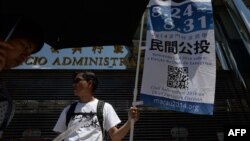Organizers of a referendum on Macau's electoral process were arrested over the weekend in a move some say shows China's nervousness over universal suffrage in the special administrative regions of Macau and Hong Kong.
The five arrested included the organizers of the referendum and representatives from local pro-democratic groups Macau Conscience, Macao Youth Dynamics and Open Macau Society.
The referendum was to be a week-long informal poll on the electoral system of the city’s Chief Executive post.
“Although it is described as a referendum it may well lead to activities that the Chinese government may consider subversive and may even lead to secession, so I think this explains the arrests,” said Simon Young, Associate Dean at the University of Hong Kong's Faculty of Law.
Referendum
The referendum was to take place from August 24 - 30 at both online and physical polling stations. Participants were required to give their identification and mobile numbers when voting. Macau police said this was a violation of a local personal data protection law.
“It is inherently illegitimate for personal information to be collected and handled by poll organizers," said Yang Chongwei, deputy coordinator of the Macau Office for Personal Data Protection.
But Jason Chao, president of the Open Macau Society and one of the five detained by police, told VOA the charges were politically motivated.
"My collection of personal data from the citizens is lawful because I have because I have obtained the citizen's consent prior to processing their data," he explained. "And after verifying the results of the referendum, the personal data will be permanently deleted. But in our case, the government is using whatever means possible to suppress our referendum."
The poll aimed to measure citizens’ support for democracy and direct elections of Macau’s leader. While activists in both Hong Kong and Macau were demanding universal suffrage, Young said Chinese leaders never agreed to allow Macau’s citizens to have greater voting rights.
“In Hong Kong there is commitment to the basic law for universal suffrage, so that’s a commitment that Beijing takes seriously, and back in 2010 they promised that to us. Here, under the Macau system, you don’t have that same commitment,” he said.
Running unopposed
Macau’s leader Fernando Chui, is running unopposed for a second five-year term and will be re-elected on August 31, the same day the poll results are due to be released. The poll in Macau was very similar to Hong Kong’s referendum earlier this summer, in which 780,000 Hong Kong residents participated.
Some activists said that while Macau’s citizens have been generally apolitical, recently there has been growing debate over a range of issues.
In May, 20,000 people protested a proposed bill that would give top officials large retirement packages and the city’s chief executive immunity from criminal prosecution. It was the largest mass protest since China assumed control of Macau in 1999.
Victor Beattie contributed to this report from Washington.




